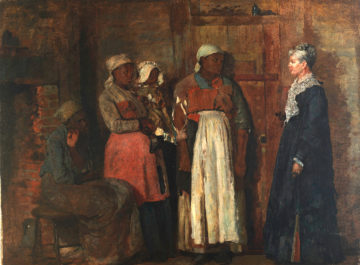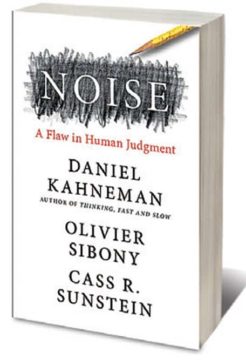Category: Recommended Reading
Persuading the Body to Regenerate Its Limbs
Matthew Hutson in The New Yorker:
 Each year, researchers from around the world gather at Neural Information Processing Systems, an artificial-intelligence conference, to discuss automated translation software, self-driving cars, and abstract mathematical questions. It was odd, therefore, when Michael Levin, a developmental biologist at Tufts University, gave a presentation at the 2018 conference, which was held in Montreal. Fifty-one, with light-green eyes and a dark beard that lend him a mischievous air, Levin studies how bodies grow, heal, and, in some cases, regenerate. He waited onstage while one of Facebook’s A.I. researchers introduced him, to a packed exhibition hall, as a specialist in “computation in the medium of living systems.”
Each year, researchers from around the world gather at Neural Information Processing Systems, an artificial-intelligence conference, to discuss automated translation software, self-driving cars, and abstract mathematical questions. It was odd, therefore, when Michael Levin, a developmental biologist at Tufts University, gave a presentation at the 2018 conference, which was held in Montreal. Fifty-one, with light-green eyes and a dark beard that lend him a mischievous air, Levin studies how bodies grow, heal, and, in some cases, regenerate. He waited onstage while one of Facebook’s A.I. researchers introduced him, to a packed exhibition hall, as a specialist in “computation in the medium of living systems.”
Levin began his talk, and a drawing of a worm appeared on the screen behind him. Some of the most important discoveries of his career hinge on the planarian—a type of flatworm about two centimetres long that, under a microscope, resembles a cartoon of a cross-eyed phallus. Levin is interested in the planarian because, if you cut off its head, it grows a new one; simultaneously, its severed head grows a new tail. Researchers have discovered that no matter how many pieces you cut a planarian into—the record is two hundred and seventy-nine—you will get as many new worms. Somehow, each part knows what’s missing and builds it anew. What Levin showed his audience was something even more striking: a video of a two-headed planarian. He had cut off the worm’s tail, then persuaded the organism to grow a second head in its place. No matter how many times the extra head was cut off, it grew back.
More here.
Mutations across animal kingdom shed new light on aging
From Phys.Org:
 The first study to compare the accumulation of mutations across many animal species has shed new light on decades-old questions about the role of these genetic changes in aging and cancer. Researchers from the Wellcome Sanger Institute found that despite huge variation in lifespan and size, different animal species end their natural life with similar numbers of genetic changes. The study, published today in Nature, analyzed genomes from 16 species of mammal, from mice to giraffes. The authors confirmed that the longer the lifespan of a species, the slower the rate at which mutations occur, lending support to the long-standing theory that somatic mutations play a role in aging.
The first study to compare the accumulation of mutations across many animal species has shed new light on decades-old questions about the role of these genetic changes in aging and cancer. Researchers from the Wellcome Sanger Institute found that despite huge variation in lifespan and size, different animal species end their natural life with similar numbers of genetic changes. The study, published today in Nature, analyzed genomes from 16 species of mammal, from mice to giraffes. The authors confirmed that the longer the lifespan of a species, the slower the rate at which mutations occur, lending support to the long-standing theory that somatic mutations play a role in aging.
Genetic changes, known as somatic mutations, occur in all cells throughout the life of an organism. This is a natural process, with cells acquiring around 20 to 50 mutations per year in humans. Most of these mutations will be harmless, but some of them can start a cell on the path to cancer or impair the normal functioning of the cell. Since the 1950s, some scientists have speculated that these mutations may play a role in aging. But the difficulty of observing somatic mutations has made it challenging to study this possibility. In the last few years, technological advances have finally allowed genetic changes to be observed in normal tissues, raising hopes of answering this question.
More here.
Thursday Poem
The Secret
Two girls discover
the secret of life
in a sudden line of
poetry.
I who don’t know the
secret wrote
the line. They
told me
(through a third person)
they had found it
but not what it was
not even
what line it was. No doubt
by now, more than a week
later, they have forgotten
the secret,
the line, the name of
the poem. I love them
for finding what
I can’t find,
and for loving me
for the line I wrote,
and for forgetting it
so that
a thousand times, till death
finds them, they may
discover it again, in other
lines
in other
happenings. And for
wanting to know it,
for
assuming there is
such a secret, yes,
for that
most of all
by Denise Levertov
from Naked Poetry
Bobbs-Merrill Company,1969
Neuroscience Gets in the Way of Appreciating Art
Kevin Berger at Nautilus:
 Describing ourselves in the language of neurobiology has got to be one of the stranger trends in our medical age. I’m depressed because my serotonin levels are low. I cried in the movie because the grieving mother activated my mirror neurons. The dopamine boost from the pinot noir planted me in a garden of bliss. For one thing, simplistic explanations for multivalent situations are a license to charlatans to ring up their cash registers with nostrums for happiness and longevity. More consequently, defining our behaviors in the confines of the brain is a pinched portrait of the ways the world draws out our potential like a conductor draws music from notes on a page. Get with it, people, you are more than your neurons.
Describing ourselves in the language of neurobiology has got to be one of the stranger trends in our medical age. I’m depressed because my serotonin levels are low. I cried in the movie because the grieving mother activated my mirror neurons. The dopamine boost from the pinot noir planted me in a garden of bliss. For one thing, simplistic explanations for multivalent situations are a license to charlatans to ring up their cash registers with nostrums for happiness and longevity. More consequently, defining our behaviors in the confines of the brain is a pinched portrait of the ways the world draws out our potential like a conductor draws music from notes on a page. Get with it, people, you are more than your neurons.
This is the passionate point of view of Alva Noë, a professor of philosophy at the University of California, Berkeley, and author of lively books that counter the notion popular among the chattering classes that you are your brain. Noë’s books include Out of Our Heads, Strange Tools, and most recently, Learning to Look, a collection of short essays in which Noë upends theories, mostly hatched in neuroscience, that shortchange the richness of experience, especially the experience of art.
more here.
A Conversation With Jeff Deutsch
Sam Gee and Jeff Deutsch at The Point:
 I’m not convinced by moralizing, I’m not convinced by “Amazon is terrible and Netflix is terrible and you should all read more, because movies are stupid.” I don’t believe any of that anyway, and even if I did, it’s not persuasive. We live a completely meaningful life without ever reading a book, full stop. You don’t need books to live a meaningful life. And yet, many people will live a more enhanced life if they read even just a couple more books. And some won’t—I mean, it’s not for everyone. So the work became articulating the pleasures and the purpose and meaning of these spaces, and hopefully doing it in a somewhat entertaining way.
I’m not convinced by moralizing, I’m not convinced by “Amazon is terrible and Netflix is terrible and you should all read more, because movies are stupid.” I don’t believe any of that anyway, and even if I did, it’s not persuasive. We live a completely meaningful life without ever reading a book, full stop. You don’t need books to live a meaningful life. And yet, many people will live a more enhanced life if they read even just a couple more books. And some won’t—I mean, it’s not for everyone. So the work became articulating the pleasures and the purpose and meaning of these spaces, and hopefully doing it in a somewhat entertaining way.
I think that one of the key qualities of any bookseller, certainly a great bookseller, is enthusiasm. And so it’s not lamentation—we don’t lament the state of the world, we’re enthusiastic about the state of books, or particular books, and share that enthusiasm.
more here.
Talking Heads live at The Kitchen (1976)
Wednesday, April 13, 2022
The Punk-Prophet Philosophy of Michel Houellebecq
Justin E. H. Smith in Foreign Policy:
 Many people, even in France, have by now forgotten a small detail of the fateful day of Jan. 7, 2015, when members of a Paris al Qaeda cell stormed the offices of the satirical newspaper Charlie Hebdo and murdered 12 cartoonists, writers, and editors. A new issue of the publication had just hit the newsstands, and all over the city, on its cover, was the caricatured image of a sickly, haggard Michel Houellebecq with a pointed magician’s cap, smoking a cigarette, looking like some untouchable warlock. “Predictions of the Magus Houellebecq”, the cover read.
Many people, even in France, have by now forgotten a small detail of the fateful day of Jan. 7, 2015, when members of a Paris al Qaeda cell stormed the offices of the satirical newspaper Charlie Hebdo and murdered 12 cartoonists, writers, and editors. A new issue of the publication had just hit the newsstands, and all over the city, on its cover, was the caricatured image of a sickly, haggard Michel Houellebecq with a pointed magician’s cap, smoking a cigarette, looking like some untouchable warlock. “Predictions of the Magus Houellebecq”, the cover read.
The occasion for this satirical treatment was Houellebecq’s new novel, Submission, whose official publication date was the very day of the attacks. In it, Houellebecq imagines a France of the near future in which the citizenry, atomized and starved of meaning in their post-Christian anomie, elect a Muslim leader into power and are converted en masse for life in a French Islamic theocracy.
Of course, what Houellebecq describes has not in fact come to pass.
More here.
Deep Learning Poised to ‘Blow Up’ Famed Fluid Equations
Jordana Cepelewicz in Quanta:
 For more than 250 years, mathematicians have been trying to “blow up” some of the most important equations in physics: those that describe how fluids flow. If they succeed, then they will have discovered a scenario in which those equations break down — a vortex that spins infinitely fast, perhaps, or a current that abruptly stops and starts, or a particle that whips past its neighbors infinitely quickly. Beyond that point of blowup — the “singularity” — the equations will no longer have solutions. They will fail to describe even an idealized version of the world we live in, and mathematicians will have reason to wonder just how universally dependable they are as models of fluid behavior.
For more than 250 years, mathematicians have been trying to “blow up” some of the most important equations in physics: those that describe how fluids flow. If they succeed, then they will have discovered a scenario in which those equations break down — a vortex that spins infinitely fast, perhaps, or a current that abruptly stops and starts, or a particle that whips past its neighbors infinitely quickly. Beyond that point of blowup — the “singularity” — the equations will no longer have solutions. They will fail to describe even an idealized version of the world we live in, and mathematicians will have reason to wonder just how universally dependable they are as models of fluid behavior.
But singularities can be as slippery as the fluids they’re meant to describe. To find one, mathematicians often take the equations that govern fluid flow, feed them into a computer, and run digital simulations. They start with a set of initial conditions, then watch until the value of some quantity — velocity, say, or vorticity (a measure of rotation) — begins to grow wildly, seemingly on track to blow up.
Yet computers can’t definitively spot a singularity, for the simple reason that they cannot work with infinite values.
More here.
Why The Past 10 Years Of American Life Have Been Uniquely Stupid
Jonathan Haidt in The Atlantic:
 The story of Babel is the best metaphor I have found for what happened to America in the 2010s, and for the fractured country we now inhabit. Something went terribly wrong, very suddenly. We are disoriented, unable to speak the same language or recognize the same truth. We are cut off from one another and from the past.
The story of Babel is the best metaphor I have found for what happened to America in the 2010s, and for the fractured country we now inhabit. Something went terribly wrong, very suddenly. We are disoriented, unable to speak the same language or recognize the same truth. We are cut off from one another and from the past.
It’s been clear for quite a while now that red America and blue America are becoming like two different countries claiming the same territory, with two different versions of the Constitution, economics, and American history. But Babel is not a story about tribalism; it’s a story about the fragmentation of everything. It’s about the shattering of all that had seemed solid, the scattering of people who had been a community. It’s a metaphor for what is happening not only between red and blue, but within the left and within the right, as well as within universities, companies, professional associations, museums, and even families.
More here.
Sabine Hossenfelder: Is Nuclear Power Green?
On Titian’s Poesie for Philip II
Emmelyn Butterfield-Rosen at Artforum:
 FEW FACES TO MEET the public spotlight in recent years have more to tell about the mental mechanisms of male shame, impunity, and self-absolution than that of the furry brown-and-white-spotted Spanish pointer staring out of Titian’s Diana and Callisto, 1556–59. This dog has been a bad dog, as he seems to know. (I say “he” since, according to the visual logic of gender organizing the suite of pictures of which Diana and Callisto forms one-sixth, Titian’s “big dog” simply can’t be a bitch.)1 Sometime previously, on a hunting trip that took an unexpected twist, this Spanish pointer turned against and devoured his master, Actaeon, a human hunter whom Diana, goddess of chastity, transformed into a stag after he came upon her bathing naked. Diana and Callisto asks its viewer to contemplate the aftermath of that attack; his master having passed through his digestive system, Actaeon’s dog, portrayed in another of the series’ pictures, reappears as a tagalong—or the captive?—of Diana’s band of proto-feminist separatists. Titian gives us the gaze of this pointer at the moment Diana is exiling Callisto, a favorite nymph who broke—unwillingly—her vow of virginity.
FEW FACES TO MEET the public spotlight in recent years have more to tell about the mental mechanisms of male shame, impunity, and self-absolution than that of the furry brown-and-white-spotted Spanish pointer staring out of Titian’s Diana and Callisto, 1556–59. This dog has been a bad dog, as he seems to know. (I say “he” since, according to the visual logic of gender organizing the suite of pictures of which Diana and Callisto forms one-sixth, Titian’s “big dog” simply can’t be a bitch.)1 Sometime previously, on a hunting trip that took an unexpected twist, this Spanish pointer turned against and devoured his master, Actaeon, a human hunter whom Diana, goddess of chastity, transformed into a stag after he came upon her bathing naked. Diana and Callisto asks its viewer to contemplate the aftermath of that attack; his master having passed through his digestive system, Actaeon’s dog, portrayed in another of the series’ pictures, reappears as a tagalong—or the captive?—of Diana’s band of proto-feminist separatists. Titian gives us the gaze of this pointer at the moment Diana is exiling Callisto, a favorite nymph who broke—unwillingly—her vow of virginity.
more here.
Race, War, and Winslow Homer
Claudia Roth Pierpont at The New Yorker:
 The linchpin of the Met’s show, “The Gulf Stream” intensifies the artist’s racial focus even as it universalizes its sailor’s plight. A single Black man, the drama’s protagonist, is shown bare-chested and casually majestic—“modelled with a musculature and physical power,” Alain Locke wrote in 1936, that “broke the cotton-patch and back-porch tradition” and “began the artistic emancipation of the Negro subject.” But his innate power is to no avail. He lies across the deck of a devastated boat, as gape-mouthed sharks close in; the water nearby is flecked with blood. A few stalks of sugarcane coil across the deck, either a plain fact of his cargo or a sign of centuries of slave trade. “I regret very much that I have painted a picture that requires any description,” Homer replied with typical asperity to questions about its meaning. He also mentioned, though, the influence of Turner’s painting “Slave Ship” (originally titled “Slavers Throwing Overboard the Dead and Dying—Typhoon Coming On”), which Ruskin had once owned but said he found too painful to keep.
The linchpin of the Met’s show, “The Gulf Stream” intensifies the artist’s racial focus even as it universalizes its sailor’s plight. A single Black man, the drama’s protagonist, is shown bare-chested and casually majestic—“modelled with a musculature and physical power,” Alain Locke wrote in 1936, that “broke the cotton-patch and back-porch tradition” and “began the artistic emancipation of the Negro subject.” But his innate power is to no avail. He lies across the deck of a devastated boat, as gape-mouthed sharks close in; the water nearby is flecked with blood. A few stalks of sugarcane coil across the deck, either a plain fact of his cargo or a sign of centuries of slave trade. “I regret very much that I have painted a picture that requires any description,” Homer replied with typical asperity to questions about its meaning. He also mentioned, though, the influence of Turner’s painting “Slave Ship” (originally titled “Slavers Throwing Overboard the Dead and Dying—Typhoon Coming On”), which Ruskin had once owned but said he found too painful to keep.
more here.
A Closer Look at Winslow Homer
The marriage delusion: a slowly unfolding apocalypse
Johanna Thomas-Corr in New Statesman:
 I’m dreaming of a book. It has the lightly worn wit of a Nora Ephron column combined with the empathy of Esther Perel. It combines the savage contrarianism of Rachel Cusk’s Aftermath with the virtuoso noticing of Joan Didion, the force of numbers that powered Caroline Criado Perez’s Invisible Women and the historical sweep of a Thomas Piketty treatise.
I’m dreaming of a book. It has the lightly worn wit of a Nora Ephron column combined with the empathy of Esther Perel. It combines the savage contrarianism of Rachel Cusk’s Aftermath with the virtuoso noticing of Joan Didion, the force of numbers that powered Caroline Criado Perez’s Invisible Women and the historical sweep of a Thomas Piketty treatise.
It examines the institution of marriage from the inside and out and answers, at last, why we continue to do this thing. Why – no one is forcing us any more! – do so many of us lash ourselves to another imperfect human being forever more and act surprised when this person fails to make us elated all the time? Why are people so outraged when presented with alternatives to a system rooted in the most regressive patriarchal property law? Why do we minimise freedom and maximise submission? Who would do that to the person they claim to love most? Besides half of the British adult population?
More here.
Wednesday Poem
“It’s so easy to fall in love,
It’s so easy to fall in love,
it’s so easy.”
………………—Buddy Holly
The Buddy Holly Poem
It’s so easy
when you realize
that all the squirrels
on the shingled rooftops
of Milwaukee
are Buddha
that all the trees shake green
in the wind
that the moon is you
Sing
that the whole of every note
is individual and one
that love is free
every day
on the blue earth
Listen to me
by Maurice Kilwein Guevara
from Touching the Fire
Anchor Books, 1998
Spark Creativity with Thomas Edison’s Napping Technique
Bret Stetka in Scientific American:
 Thomas Edison was famously opposed to sleeping. In an 1889 interview published in Scientific American, the ever energetic inventor of the lightbulb claimed he never slept more than four hours a night. Sleep was, he thought, a waste of time.
Thomas Edison was famously opposed to sleeping. In an 1889 interview published in Scientific American, the ever energetic inventor of the lightbulb claimed he never slept more than four hours a night. Sleep was, he thought, a waste of time.
Yet Edison may have relied on slumber to spur his creativity. The inventor is said to have napped while holding a ball in each hand, presuming that, as he fell asleep, the orbs would fall to the floor and wake him. This way he could remember the sorts of thoughts that come to us as we are nodding off, which we often do not recall. Sleep researchers now suggest that Edison might have been on to something. A study published recently in Science Advances reports that we have a brief period of creativity and insight in the semilucid state that occurs just as we begin to drift into sleep, a sleep phase called N1, or nonrapid-eye-movement sleep stage 1. The findings imply that if we can harness that liminal haze between sleep and wakefulness—known as a hypnagogic state—we might recall our bright ideas more easily.
More here.
Tuesday, April 12, 2022
Noise: A Flaw in Human Judgment—A Review
Rob Henderson in Quillette:
 Are crowds smart or dumb? You may have heard the terms “wisdom of the crowds” and the “madness of crowds.” The former idea is that the collective opinion of a group of people is often more accurate than any individual person, and that gathering input from many individuals averages out the errors of each person and produces a more accurate answer. In contrast, the “madness of crowds” captures the idea that, relative to a single individual, large numbers of people are more likely to indulge their passions and get carried away by impulsive or destructive behaviors. So, which concept more accurately reflects reality?
Are crowds smart or dumb? You may have heard the terms “wisdom of the crowds” and the “madness of crowds.” The former idea is that the collective opinion of a group of people is often more accurate than any individual person, and that gathering input from many individuals averages out the errors of each person and produces a more accurate answer. In contrast, the “madness of crowds” captures the idea that, relative to a single individual, large numbers of people are more likely to indulge their passions and get carried away by impulsive or destructive behaviors. So, which concept more accurately reflects reality?
Noise: A Flaw in Human Judgement by Daniel Kahneman, Olivier Sibony, and Cass R. Sunstein provides the answer. The authors share research indicating that “independence is a prerequisite for the wisdom of crowds.” That is, if you want to use crowdsourcing to produce accurate information, you have to ensure that people make their judgments in private. If people provide their answers in a public setting where they can see everyone else’s answers, then the crowd can transform wisdom into madness.
More here.
India’s Inadvertent Missile Launch Underscores the Risk of Accidental Nuclear Warfare
Zia Mian and M. V. Ramana in Scientific American:
 Last month, while most of the world focused on the war in Ukraine and worried that a beleaguered Russian leadership might resort to nuclear weapons, thus escalating the conflict into a direct war with the U.S.-led NATO nuclear-armed alliance, a nearly tragic accident involving India and Pakistan pointed to another path to nuclear war. The accident highlighted how complex technological systems, including those involving nuclear weapons, can generate unexpected routes to potential disaster—especially when managed by overconfident organizations.
Last month, while most of the world focused on the war in Ukraine and worried that a beleaguered Russian leadership might resort to nuclear weapons, thus escalating the conflict into a direct war with the U.S.-led NATO nuclear-armed alliance, a nearly tragic accident involving India and Pakistan pointed to another path to nuclear war. The accident highlighted how complex technological systems, including those involving nuclear weapons, can generate unexpected routes to potential disaster—especially when managed by overconfident organizations.
India and Pakistan possess more than 300 nuclear weapons between them, and have fought multiple wars and faced many military crises. On March 9, three years after their dispute over Kashmir escalated into attacks by jet fighters, the Pakistan Air Force detected “a high speed flying object” inside Indian territory change course and veer suddenly toward Pakistan.* It flew deep into Pakistan and crashed. The object was a BrahMos cruise missile, a weapon system developed jointly by India and Russia. India soon stated the launch was an accident.
More here.
Signaling Theory and Virtue Signaling
Tadeg Quillien in Aeon:
 As a quick stroll on social media reveals, most people love showing that they are good. Whether by expressing compassion for disaster victims, sharing a post to support a social movement, or denouncing a celebrity’s racist comment, many people are eager to broadcast their high moral standing.
As a quick stroll on social media reveals, most people love showing that they are good. Whether by expressing compassion for disaster victims, sharing a post to support a social movement, or denouncing a celebrity’s racist comment, many people are eager to broadcast their high moral standing.
Critics sometimes dismiss these acts as mere ‘virtue signalling’. As the British journalist James Bartholomew (who popularised the term in a magazine article in 2015) remarks, virtue signallers enjoy the privilege of feeling better about themselves by doing very little. Unlike the kind of helping where you have to do something – help an old lady cross the street, volunteer to give meals to the dispossessed, go door-to-door to fundraise for a cause – virtue signalling often consists of completely costless actions, such as changing your profile picture or saying you don’t like a politician’s stance on immigration. Bartholomew complains that ‘saying the right things violently on Twitter is much easier than real kindness’.
Virtue signalling can be easy – but why does that make it seem bad?
More here.
